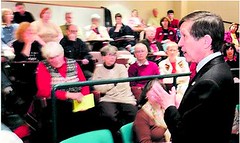Information-based economy my foot
1.) The latest employment figures are in, and Paul Craig Roberts, who was Assistant Secretary of the Treasury under Reagan, will help you read them. The title of his article is a good start: “America is Losing”. Roberts’ side-thesis: analysts and politicians who argue that U.S. workers get back more from trade agreements than is taken from them—they’re losing, too. As far as reason is concerned, that is.
2.) Last Saturday, Dennis Kucinich addressed the Maine Progressive Caucus in Augusta. I am not a member of this group, but my brother and I went to hear him speak. (In the photo, you can see me just northwest of Kucinich’s forehead. I am wearing a red sweater and sitting in the back row.)

I seized an opportunity to cut off a woman who was—understandably—venting her rage about the proposed dismantling of Social Security, jumping in with a question designed to get Kucinich to say something about CAFTA. I said that our governor is fond of speaking of “transitioning” to an “information-based” or “knowledge-based” or “creative” economy, which, in view of what’s been happening in Maine, rings crassly euphemistic. Transitioning to a third-world economy might be a more literal description, and CAFTA will only further this trend.
Kucinich said that if what is meant by “transitioning to an information-based economy” is making wireless internet access cheap and universally available, or investing in technologies that would help genuinely small businesses, he’s all for it. But the present structure of trade agreements has been a disaster for American workers. Kucinich took off one of his shoes and held it up so we could see the Dexter logo inside. Dexter closed its factories in Maine in 2001, though its factory stores are still open, stocked with shoes manufactured in China. Kucinich framed this as another rude confirmation of his thesis that “cheap labor is the oldest story in human history.”
2.) Last Saturday, Dennis Kucinich addressed the Maine Progressive Caucus in Augusta. I am not a member of this group, but my brother and I went to hear him speak. (In the photo, you can see me just northwest of Kucinich’s forehead. I am wearing a red sweater and sitting in the back row.)

I seized an opportunity to cut off a woman who was—understandably—venting her rage about the proposed dismantling of Social Security, jumping in with a question designed to get Kucinich to say something about CAFTA. I said that our governor is fond of speaking of “transitioning” to an “information-based” or “knowledge-based” or “creative” economy, which, in view of what’s been happening in Maine, rings crassly euphemistic. Transitioning to a third-world economy might be a more literal description, and CAFTA will only further this trend.
Kucinich said that if what is meant by “transitioning to an information-based economy” is making wireless internet access cheap and universally available, or investing in technologies that would help genuinely small businesses, he’s all for it. But the present structure of trade agreements has been a disaster for American workers. Kucinich took off one of his shoes and held it up so we could see the Dexter logo inside. Dexter closed its factories in Maine in 2001, though its factory stores are still open, stocked with shoes manufactured in China. Kucinich framed this as another rude confirmation of his thesis that “cheap labor is the oldest story in human history.”


0 Comments:
Post a Comment
<< Home